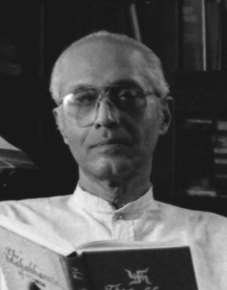There was no photograph of his, nor any flowers offered. Tribute to Professor P. Lal at the Birla Academy of Art and Culture was an evening of reminiscences.
A conglomeration of people whose lives he touched - an author he discovered, an old friend of the 60s, two students he mentored - engaged in a free-wheeling chat peppered with memories, much like the Sunday morning addas at his Lake Gardens home.
Jayshree Mohta led the reminiscences, talking of the deep bond between P. Lal and Basant Kumar Birla and Sarala Devi, the three of who shared an admiration for Gandhiji's pacifism.
Born in Kapurthala, P. Lal's father left for Calcutta when he was rebuked by his grandfather for having helped a woman of a lower caste draw water from the well. Mohta remembered how Lal's house had books everywhere, even on the side of the steps. 'He would say 'we built this house book by book',' she said.
Mohta and her cousins were tutored by Lal, who 'not only taught us literature but also regaled us with snippets on religion, philosophy and world history'.
P. Lal and his wife Shyamasree spent most evenings editing manuscripts of first-time authors that were then published by Writers Workshop, an alternative independent publishing house.
Poet Mamang Dai's association with P. Lal was through the publication of her first book River Poems by Writers Workshop.
A reviewer from Gulf Times once wrote: 'Publisher P. Lal is a symbol of high optimism. He has no office. He operates from his living room and bedroom. He has no editor or proofreader or distributor. He does everything himself from editing, deleting, replying to author letters in longhand. There were intermittent sales through Book Nook, a cubby hole near his house. Yet Writers Workshop had done 3,000 titles published over 46 years.' That goes to show how low-key entrepreneurship can hold its own, Dai said.
Each Writers Workshop book is a hand-crafted artefact. Dai's River Poems was gold-embossed, hand-stitched and hand-bound. 'I realise the meaning of the word attention now. Attention is a courtesy we can give each other. It was comforting giving my manuscript to Writers Workshop. P. Lal steered me on the road of my writing career with his knowledge and attention,' said the author.
Dai never met Lal but spoke to him over phone and exchanged mails. 'Salutations travelled from Itanagar to Lake Gardens. I sensed he was a very committed, knowledgeable and deeply spiritual person with a sense of aesthetics and moral integrity.'
Mary Ann Dasgupta described the Sunday addas as 'friendly, mentally invigorating and warmly welcoming. 'The door was always open. You were made to feel as if you belonged there. The house was lined with books. You sat on chairs, stools or on the floor. Lal was always in his signature long kurta pyjamas. He could be heard before he was seen. His mellifluous voice enthralled generations of students. Poems would be read and thoughtfully discussed. Literary views shared. Lifelong friendships were forged. At the end there would be Shyamasree Devi's tea and savouries. We were enriched, encouraged and eagerly looking forward to the next meeting.'
Kishore Bhimani spoke of the debates between Lal and Professor Viswanathan. 'His cutting sense of humour came in full play during those debates where Lal and Viswanathan would invariably be the lead speakers in opposing teams.'
About his classes, Bhimani said: 'He would never scold anyone. Once a boy was distracting others. He said 'I know the gentleman beside Kishore Bhimani disagrees with my analysis of Tennyson. He will be given a chance to state his views once my lecture is over'. From then the boy kept silent.'
Speaking about Lal's use of phrases and choice of language, Bhimani said the professor could have given Shashi Tharoor a run for his money. In a review of Sasthi Brata's Confessions of an Indian Woman Eater, Lal wrote: 'The author needs to learn the use of hyphen. It should either be Confessions of an Indian-Woman Eater or Confessions of an Indian Woman-Eater.'
Lal's student Pradeep Bhattacharya, who is finishing the transcreation of Anushasana Parva, the only parva of Mahabharata that Lal left unfinished in his gigantic task of transcreating the Sanskrit Mahabhrata into English, also spoke on the occasion. 'I had joined the class of English literature at St Xavier's College in 1963. This handsome and tall professor in well-fitted trousers and polo neck shirt drew a genealogical tree of Greek myth while teaching Ode to a Nightingale. This was how he expanded our horizon,' narrated Bhattacharya. Talking about his charisma, Bhattacharya said, Lal rode a scooter with a side car in which sat his wife. Sadhan Kumar Ghosh, another author mentored by Lal, wrote: He drove through Calcutta like a poetic cyclone.
Speaking about how Lal helped students, Bhattacharya said: 'When P. Lal started lecturing in Caclutta University in 1968, he was asked to teach Thomas Brown and the Book of Job. He always came to class with half a dozen books under his arm, books that he knew students would need for referencing. He provided us with a summary of Thomas Brown and told us to tackle Book of Job as a drama. He prepared us for our exams.'
That is how Lal would be remembered by scores of his students, as someone who prepared them for the exam of life.











